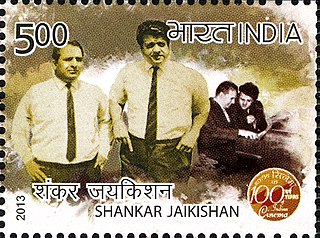
Shankar–Jaikishan, were an Indian composer duo of the Hindi film industry, working together from 1949 to 1971. They are widely considered to be one of the greatest ever music composers of the Hindi film industry.

Jis Desh Mein Ganga Behti Hai is a 1960 Indian film directed by Radhu Karmakar and produced by Raj Kapoor. The film stars Padmini, Raj Kapoor and Pran in lead roles. This was the first directorial venture of Karmakar, who had previously been cinematographer for many of Kapoor's films. It was declared a "hit" at Box Office India.
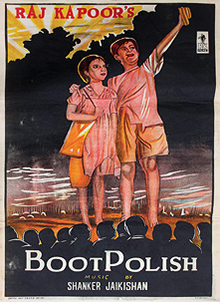
Boot Polish is a 1954 Hindi comedy drama directed by Prakash Arora and produced by Raj Kapoor. It won Best Film at the Filmfare Awards. The film stars Ratan Kumar and Naaz in the lead roles.

Anari is a 16 January 1959 Indian Hindi-language comedy film directed by Hrishikesh Mukherjee. The film stars Raj Kapoor, Nutan, Motilal and Lalita Pawar. The music was by Shankar Jaikishan and the lyrics by Hasrat Jaipuri and Shailendra. This was among the few movies in which Lalita Pawar played a positive role and Motilal a role with shades of grey. The film was remade in Tamil as Pasamum Nesamum.

Hasrat Jaipuri, born Iqbal Hussain, was an Indian poet, who wrote in the Hindi and Urdu languages. He was also a renowned film lyricist in Hindi films, where he won the Filmfare Awards for Best Lyricist twice – in 1966 and 1972.
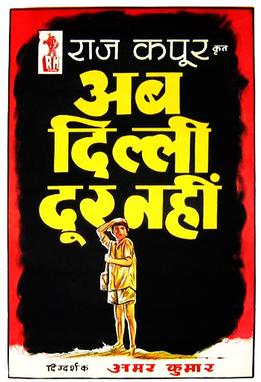
Ab Dilli Dur Nahin is a 1957 Indian Hindi-language film directed by Amar Kumar and written by Rajinder Singh Bedi and Muhafiz Hyder. The film was produced by Raj Kapoor and starred Yakub, Anwar Hussain, Motilal, Jagdeep and Amjad Khan.
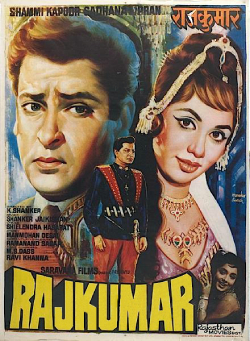
Rajkumar is a 1964 Hindi film directed by K. Shankar. It stars Prithviraj Kapoor, Shammi Kapoor, Sadhana, Pran, Om Prakash. The music is by Shankar-Jaikishan and the lyrics were written by Hasrat Jaipuri and Shailendra. The film became a huge box office hit.
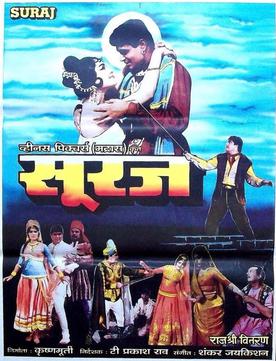
Suraj (transl. Sun) is a 1966 Hindi-language swashbuckler Ruritanian romance film produced by S. Krishnamurthy and T. Govindarajan and directed by T. Prakash Rao.

Albela is a Bollywood film released in 1971. It was directed by A. Shamsher and produced by Sanat Kothari.
Bhai-Bhai (transl. Brothers) is a 1970 Bollywood suspense drama film directed by Raja Nawathe. It had music by Shankar Jaikishen with lyrics by Hasrat Jaipuri. The film stars Sunil Dutt, Asha Parekh, Mumtaz, Mehmood and Pran. It performed "above average" at the box office.

Mayurpankh is a 1954 Indian film directed by Kishore Sahu. It was screened in the 1954 Cannes Film Festival, where it competed for the Grand Prize of the Festival. The choreography of the Kathak dance in it was by Shirin Vajifdar, a pioneering Parsi dancer. The film is in colour.

Gaban (transl. Embezzlement) is 1966 Hindi film directed by Hrishikesh Mukherjee, based on Munshi Premchand's classic novel by the same name. It had Sunil Dutt and Sadhna playing the lead role. The film has music by Shankar Jaikishan, and lyrics were by Shailendra and Hasrat Jaipuri.
New Delhi is a 1956 Indian Hindi-language black and white romantic comedy film written by Radhakishen with Inder Raj Anand and directed by Mohan Segal. The film starred Vyjayanthimala and Kishore Kumar in the lead, with Jabeen Jalil, Nana Palsikar, Nazir Hussain, Prabhu Dayal, Dhumal, Brahm Bhardwaj, Radhakrishan, Mumtaz Begum, Mirza Musharraf and Shivraj as the ensemble cast. The film was produced by Mohan Segal himself. The film's score was composed by Shankar Jaikishan duo with lyrics provided by Hasrat Jaipuri and Shailendra, edited by Pratap Dave and was filmed by K. H. Kapadia. The story is about the Punjabi boy Anand and the Tamil girl Janaki who fall in love with each other, but unfortunately were separated by their families.

Duniya is a 1968 Indian Hindi-language romantic thriller film written by K. A. Narayan and directed by T. Prakash Rao. The film starred Dev Anand, Vyjayanthimala in the lead with Balraj Sahni, Johnny Walker, Lalita Pawar, Prem Chopra, Sulochana Latkar, Madan Puri, Nana Palsikar, Achala Sachdev, Laxmi Chhaya, Jagdish Raj, Tun Tun, Brahm Bhardwaj and Pakistani actor Suresh as the ensemble cast. The film was produced by Amarjeet. The film's score was composed by Shankar Jaikishan duo with lyrics provided by Hasrat Jaipuri, S. H. Bihari and Gopaldas Neeraj, edited by Shivaji Awdhut and was filmed by Faredoon A. Irani. The story revolves around three friends, how they face their problems in life, and how they recover from the problems in the rest of the story.

Patrani is a 1956 Hindi black and white historical drama written by R. S. Choudhury and directed by Vijay Bhatt. The film starred Vyjayanthimala and Pradeep Kumar, with Shashikala, Durga Khote, Om Prakash, Jeevan, David Abraham Cheulkar, Leela Mishra, Kanchanamala, Praveen Paul, Ramesh Sinha, Gadadhar Sharma, Maya, Krishnakant, Helen and Sheila Vaz, forming an ensemble cast. The film was produced by Shankerbhai Bhatt. The film's score was composed by Shankar Jaikishan duo with lyrics provided by Shailendra and Hasrat Jaipuri. Editing was done by Shivaji Awdhut and filming was by K. H. Kapadia. The story revolves around the king, Karma Dev and his attitude.

Hare Kanch Ki Chooriyan is a 1967 Hindi, social family drama film, produced and directed by Kishore Sahu. The story, screenplay and dialogue were written by Kishore Sahu. Shankar Jaikishan composed the music while the lyrics were written by Hasrat Jaipuri and Shailendra. Sahu presented his daughter Naina Sahu, in her debut acting role, as the main character. The film starred Biswajeet, Naina Sahu, Shiv Kumar, Nazir Hussain, Rajendranath, Helen and Lalita Pawar.

Hamlet is a 1954 Hindi tragedy drama film, produced and directed by Kishore Sahu. The film was a free adaptation of Shakespeare's tragedy, with Sahu playing Hamlet as well as writing the screenplay, while the dialogue was by Amanat Hilal and B. D. Verma. It was produced by Hindustan Chitra, a production company started by Sahu in 1944. It was Ramesh Naidu's first film as a music composer. The film starred Mala Sinha, Kishore Sahu, Venus Banerji, Kamaljeet and Jankidas.

Ujala (Light/Luminosity) is a Bollywood romantic crime film released in 1959, starring Shammi Kapoor, Mala Sinha, Raaj Kumar, Leela Chitnis and Tun Tun. Naresh Saigal was the story writer as well as the director. Ujala features one of the popular Bollywood songs "Jhoomta Masoom, Mast Mahina" played by Shammi Kapoor and Mala Sinha, sung by Manna Dey and Lata Mangeshkar. The film came with a message; "Honesty always triumphs". The film's music was by Shankar–Jaikishan, with lyrics by Shailendra and Hasrat Jaipuri.
















